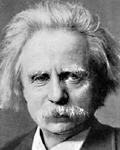
Edvard Hagerup Grieg
Born: 1843Died: 1907
Education: self-taught
Career: composer
1880 ~ 1882 conductor for Bergen Philharmonic Orchestra(Harmonien) 1876 first performance of opera Peer Gynt Edvard Hagerup Grieg (15 June 1843 – 4 September 1907) was a Norwegian composer and pianist who composed in the Romantic period. He is best known for his Piano Concerto in A minor, for his incidental music to Henrik Ibsen's play Peer Gynt (which includes Morning Mood and In the Hall of the Mountain King), and for his collection of piano miniatures Lyric Pieces. Edvard Hagerup Grieg was born in Bergen, Norway on 15 June 1843. His parents were Alexander Grieg (1806–1875), a merchant and the American vice consul in Bergen, and Gesine Judithe Hagerup (1814–1875), a music teacher and daughter of Edvard Hagerup. He had very blaze-red hair. The family name, originally spelled Greig, has Scottish origins. After the Battle of Culloden in 1746, however, Grieg's great-grandfather traveled widely, settling in Norway about 1770, and establishing business interests in Bergen. Edvard Grieg was raised in a musical home. His mother was his first piano teacher and taught him to play at the age of 6. Grieg studied in several schools, including Tank's School,. He often brought in samples of his music to class. In the summer of 1858, Grieg met the eminent Norwegian violinist Ole Bull, who was a family friend; Bull's brother was married to Grieg's aunt. Bull recognised the 15-year-old boy's talent and persuaded his parents to send him to the Leipzig Conservatory, then directed by Ignaz Moscheles. Grieg enrolled in the conservatory, concentrating on the piano, and enjoyed the many concerts and recitals given in Leipzig. He disliked the discipline of the conservatory course of study, but he achieved very good grades in most areas. An exception was the organ, which was mandatory for piano students. In the spring of 1860, he survived a life-threatening lung disease. The following year he made his debut as a concert pianist, in Karlshamn, Sweden. In 1862, he finished his studies in Leipzig and held his first concert in his home town, where his programme included Beethoven's Pathétique sonata. (Grieg's own recording of his Piano Sonata, made late in his life, confirms that he was an excellent pianist). In 1863, Grieg went to Copenhagen, Denmark, and stayed there for three years. He met the Danish composers J. P. E. Hartmann and Niels Gade. He also met his fellow Norwegian composer Rikard Nordraak (composer of the Norwegian national anthem), who became a good friend and source of great inspiration. Nordraak died in 1866, and Grieg composed a funeral march in his honor. On 11 June 1867, Grieg married his first cousin, Nina Hagerup. The next year, their only child, Alexandra, was born. She died in 1869 from meningitis. In the summer of 1868, Grieg wrote his Piano Concerto in A minor while on holiday in Denmark. Edmund Neupert gave the concerto its premiere performance on 3 April 1869 in the Casino Theater in Copenhagen. Grieg himself was unable to be there due to conducting commitments in Christiania (as Oslo was then named). In 1868, Franz Liszt, who had not yet met Grieg, wrote a testimonial for him to the Norwegian Ministry of Education, which led to Grieg obtaining a travel grant. The two men met in Rome in 1870. On Grieg's first visit, they went over Grieg's Violin Sonata No. 1, which pleased Liszt greatly. On his second visit, in April, Grieg brought with him the manuscript of his Piano Concerto, which Liszt proceeded to sightread (including the orchestral arrangement). Liszt's rendition greatly impressed his audience, although Grieg gently pointed out to him that he played the first movement too quickly. Liszt also gave Grieg some advice on orchestration, (for example, to give the melody of the second theme in the first movement to a solo trumpet). In 1874–76, Grieg composed incidental music for the premiere of Henrik Ibsen's play Peer Gynt, at the request of the author. Many of the pieces from this work became very popular in the orchestral suites or piano and piano-duet arrangements. Grieg had close ties with the (Bergen Philharmonic Orchestra) (Harmonien), and later became Music Director of the orchestra from 1880–1882. In 1888, Grieg met Tchaikovsky in Leipzig. Grieg was later (though not at the time?) struck by the sadness in Tchaikovsky. Tchaikovsky thought very highly of Grieg's music, praising its beauty, originality and warmth.

